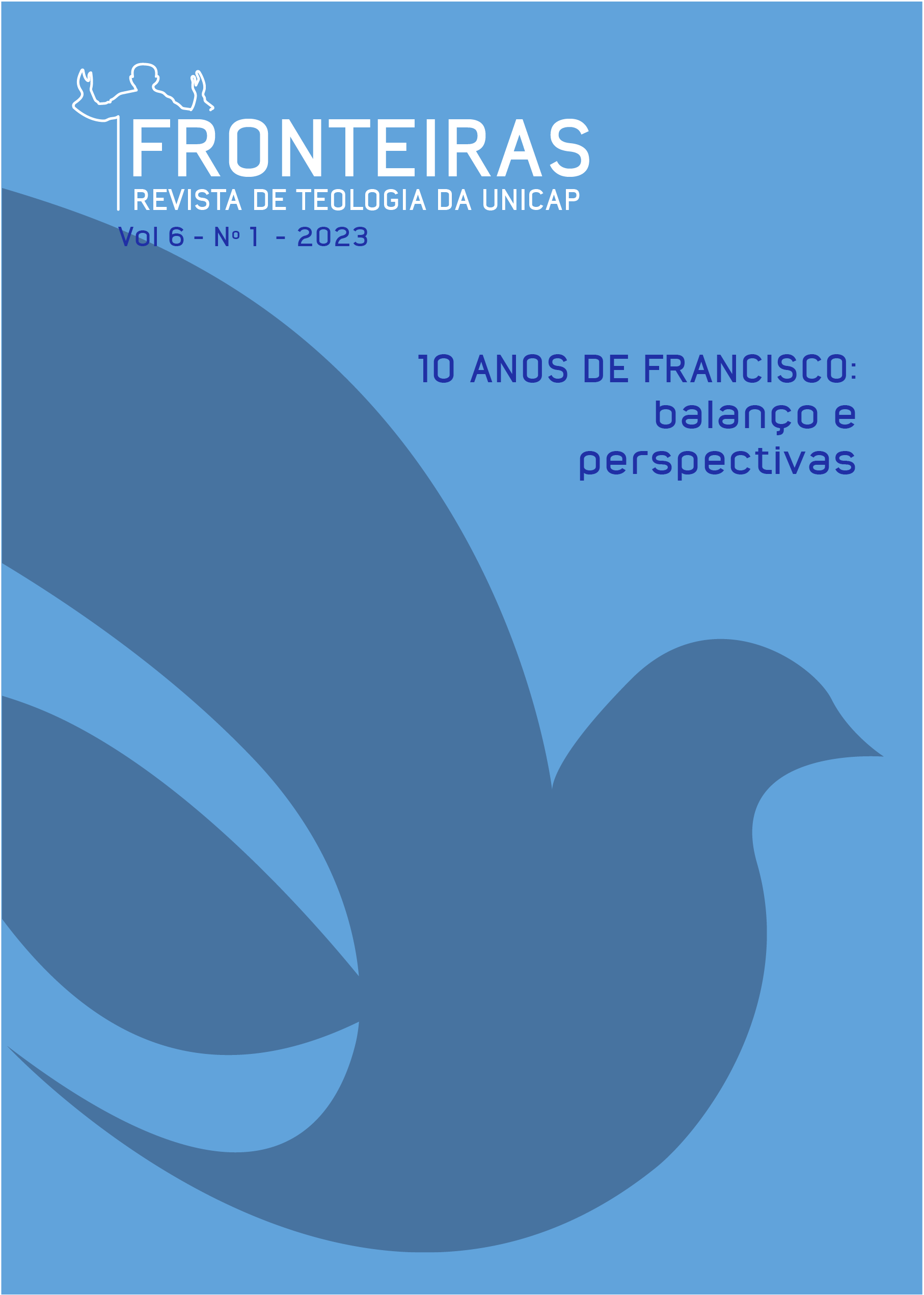The place of the Letter of James in the Biblical Canon
DOI:
https://doi.org/10.25247/2595-3788.2023.v6n1.p126-145Keywords:
Letter of James, Biblical canon, Faith and works, Justification, AporophobiaAbstract
The object of the present study is the Letter of James and its place in the biblical canon. The Letter is among those writings of the New Testament that have the most difficulty in having its canonicity accepted, having been put under suspicion again at the time of the Reformation. Since the definition of canon is not restricted to the list of writings that make up the Bible, but also indicates the rule of faith expressed by these writings, one can ask whether aporophobia, a common attitude today, even among Christians, does not tacitly imply in a new rejection of the Letter of James, for the contempt of its teaching in relation to the poor. The methodology used in the investigation was essentially that of bibliographic research. After carrying out the presentation of the theme, it was concluded that the Letter of James contains such greatness in its teachings to emerge victorious from the mishaps through which it passed. The problems pass, the Letter of James remains.
Downloads
References
BÍBLIA (A): Novo Testamento. 1. reimp. São Paulo: Paulinas, 2016.
BIBLIA Hebraica Stuttgartensia: Exodus et Leviticus. Praeparavit G. Quell. Stuttgart: Deutsche Bibelgesellschaft, 1990.
BIBLIA Hebraica Stuttgartensia: Numeri et Deuteronomium. Praeparaverunt W. Rudolph; J. Hempel. Stuttgart: Deutsche Bibelgesellschaft, 1983.
BONG, Joon-ho (Diretor). Parasita (filme). Barunson E&A; CJ Entertainment.
CANTINAT, J. La lettera di Giacomo. In: GEORGE, A.; GRELOT, P. Introduzione al Nuovo Testamento. 3. Le lettere apostoliche. Edizione italiana a cura de R. Fabris. Roma: Borla, 1993; p. 217-234.
CONCÍLIO Vaticano II. Constituição dogmática Dei Verbum sobre a revelação divina. In: Compêndio do Vaticano II: constituições, decretos, declarações. Introdução e índice analítico de Boaventura Kloppenburg. Coordenação geral de Frederico Vier. Petrópolis: Vozes, 2000. 29ª edição; p. 119-139.
CONCORDANCE to the Novum Testamentum Graece of Nestle-Aland, 26th edition, and to the Greek New Testament, 3rd edition. Berlin; New York: de Gruyter, 1987.
CORTINA, Adela. Aporofobia, a aversão ao pobre: um desafio para a democracia. Tradução D. Febre. São Paulo: Contracorrente, 2020.
DAVIDS, P. H. Tiago e Paulo. In: HAWTHORNE, G. F.; MARTIN, R. P.; REID, D. G. (Orgs.) Dicionário de Paulo e suas cartas. Tradução B. T. Lambert. São Paulo: Vida Nova, Paulus, Loyola, 2008; p. 1201-1205.
DEUS, F. R. de. O conceito “aporofobia” de Adela Cortina: reflexões sobre a sistêmica aversão aos pobres e a (sic.) pobreza. In Anãnsi: Revista de Filosofia, Salvador, v. 2, n. 1, p. 123-136, 2020. Disponível em: <https://revistas.uneb.br/index.php/anansi/article/view/12232/8240> Acesso em: 07 set. 2022.
ENCHIRIDION Biblicum: documenta ecclesiastica Sacra Scripturam Spectantia. Auctoritate Ponticifiae Commissionis de Re Biblica edita. Neapoli: M. D’Auria Pontificius Editor; Romae: Editiones Comm. A. Arnodo, 1956. Editio tertia aucta et recognita.
FRANCISCO, PP. Carta encíclica Fratelii tutti sobre a fraternidade e a amizade social. Tradução oficial da Santa Sé. São Paulo: Paulinas, 2021. 2ª reimpressão.
KÜMMEL, W. G. Introdução ao Novo Testamento. Tradução da 17ª edição inteiramente refundida e aumentada por P. Feine e J. Behm por I. F. L. Ferreira e J. Paixão Neto. São Paulo: Paulus, 1982.
MANNUCCI, V. Bíblia, palavra de Deus: curso de introdução à Sagrada Escritura. Apresentação de L. Alonso Schökel. Tradução Luiz João Gaio. Revisão literária e exegética A. Alvarez. São Paulo: Paulus, 2008. 4ª edição.
MAYER, T. da S. Miséria acima dos pobres. E os cristãos? In: Dom total, 02/02/2021. Disponível em: <https://domtotal.com/noticias/index.jsp?id=1497191> Acesso em: 07 set. 2022.
NOVO Testamento grego (O): com introdução em português e dicionário grego-português. Stuttgart: Deutsche Bibelgesellschaft; Barueri: Sociedade Bíblica do Brasil, 2009. 4ª edição revisada.
PEDROSA-PÁDUA, L. A opção preferencial pelos pobres diante da aporofobia: reflexões antropológicas para uma atualização da opção de Puebla. In Horizonte, Belo Horizonte, v. 17, n. 54, p. 1479-1502, set./dez. 2019. Disponível em: <http://periodicos.pucminas.br/index.php/horizonte/article/view/21128> Acesso em: 07 set. 2022. DOI: https://doi.org/10.5752/P.2175-5841.2019v17n54p1479.
PONTIFÍCIA COMISSÃO BÍBLICA. A interpretação da Bíblia na Igreja. Petrópolis: Vozes, 1994.
RAMÓN FERNÁNDEZ, F.; PRÓSPER RIBES, J. Aporofobia, segregación y descenso a los infiernos. Ética y Cine, Córdoba, v. 11, n. 1, p. 31–39, 2021. Disponível em <https://revistas.unc.edu.ar/index.php/eticaycine/article/view/32570/33285> Acesso em: 07 set. 2022. DOI: https://doi.org/10.31056/2250.5415.v11.n1.32570.
RUSCONI, C. Dicionário grego do Novo Testamento. Tradução I. Rabuske. São Paulo: Paulus, 2003.
SEPTUAGINTA: is est Vetus Testamentum graece iuxta LXX interpretes. Edidit Alfred Rahlfs. Stuttgart: Deutsche Bibelgesellschaft, 1979.
VOUGA, F. A Carta de Tiago. Tradução M. Bagno. Supervisão exegética J. Konings. São Paulo: Loyola, 1996.
Downloads
Published
Issue
Section
License
Copyright (c) 2023 Claudio Vianney Malzoni

This work is licensed under a Creative Commons Attribution 4.0 International License.
Autores que publicam nesta revista concordam com os seguintes termos:
- Autores mantém os direitos autorais e concedem à Fronteiras - Revista de Teologia da Unicap o direito de primeira publicação, com o trabalho simultaneamente licenciado sob a Licença Creative Commons Attribution que permite o compartilhamento do trabalho com reconhecimento da autoria e publicação inicial nesta Revista.
- Autores têm autorização para assumir contratos adicionais separadamente, para distribuição não-exclusiva da versão do trabalho publicada nesta revista (ex.: publicar em repositório institucional ou como capítulo de livro), desde que reconheça e indique a autoria e a publicação inicial nesta Revista.
- Autores têm permissão e são estimulados a publicar e distribuir seu trabalho online (ex.: em repositórios institucionais ou na sua página pessoal) a qualquer momento depois da conclusão de todo processo editorial, já que isso pode gerar alterações produtivas, bem como aumentar o impacto e a citação do trabalho publicado (Veja O Efeito do Acesso Livre).






















